All Management News
- Dr Ravi Kumar September 1, 2022
- Get a clearer vision of your higher education September 1, 2022
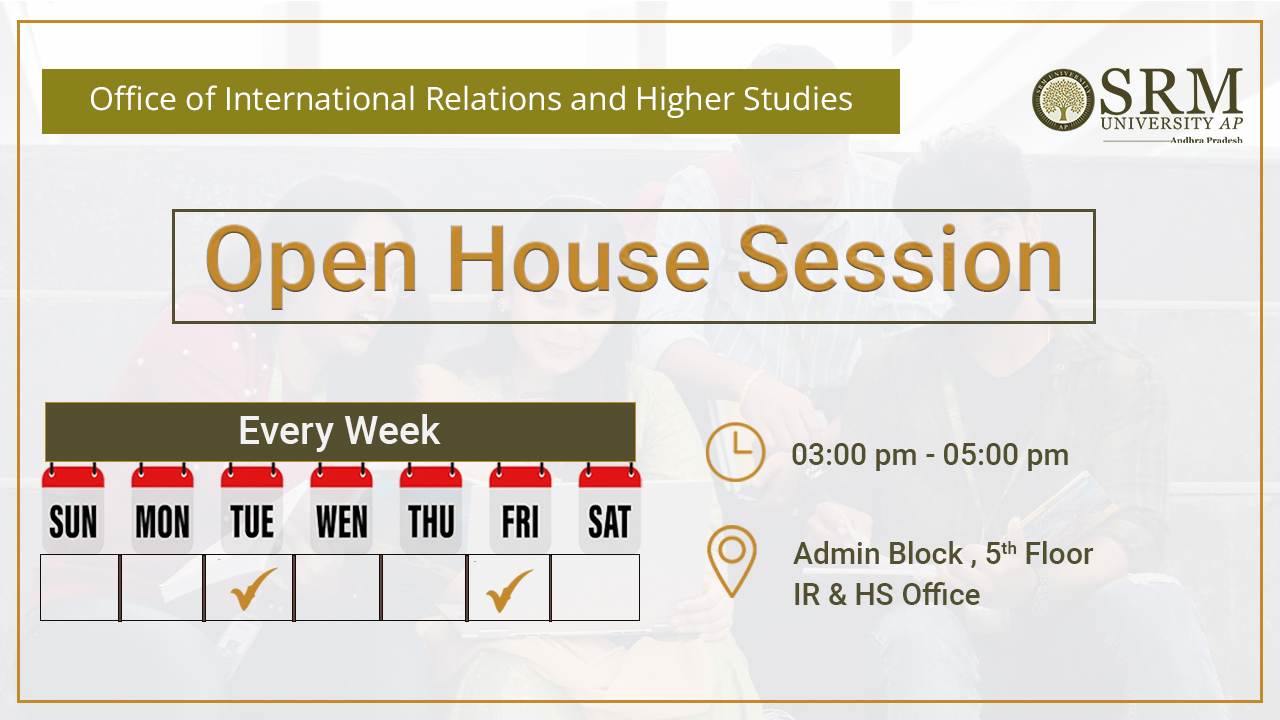 SRM University-AP has been an innovator in higher education, reaching out to promising students, embracing the novelties of learning processes, and promoting a global vision since its inception. The institution leaves no stone unturned in accelerating students’ enthusiasm to approach their higher education with determination and perseverance. The Office of International Relations and Higher Studies will host an Open House session every Tuesday and Friday to converse with students who aspire to take their higher education to the next level.
SRM University-AP has been an innovator in higher education, reaching out to promising students, embracing the novelties of learning processes, and promoting a global vision since its inception. The institution leaves no stone unturned in accelerating students’ enthusiasm to approach their higher education with determination and perseverance. The Office of International Relations and Higher Studies will host an Open House session every Tuesday and Friday to converse with students who aspire to take their higher education to the next level.Date: Every week- Tuesday and Friday
Time: 03.00 pm to 5.00 pm
Venue: IR&HS Office
The session will focus on areas such as favoured destination, course selection, preferred universities, SOP review, etc. Students still indecisive about their higher studies will hugely benefit from the essence of this Open House session.
Join the session and get a step ahead in your higher education venture!
Continue reading → - Large-scale production of BP nanosheets September 1, 2022
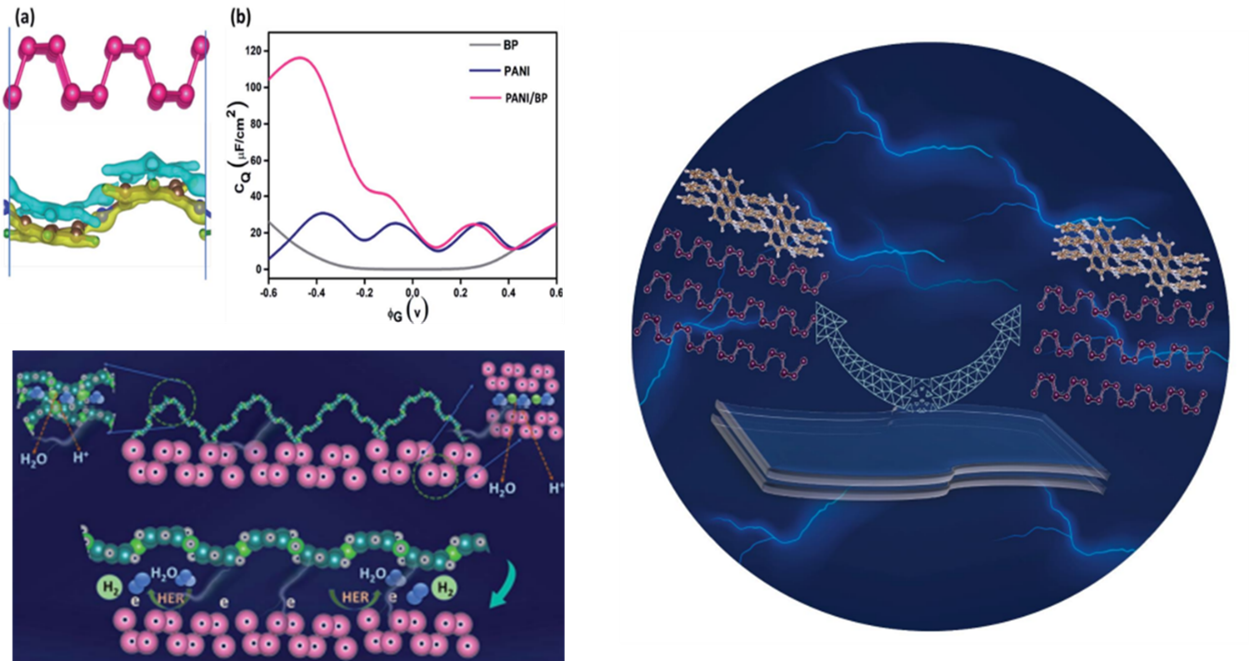 Research at the Department of Physics has effectively produced and characterised BP nanosheets on a large scale by a simple solvothermal approach, and the formation mechanisms are discussed. The paper, 2D-Black Phosphorus/Polyaniline Hybrids for Efficient Supercapacitor and Hydrogen Evolution Reaction Applications Check for updates, has been published by Prof Ranjit Thapa, Associate Dean of Sciences, as a corresponding author, and his PhD student, Mr Samadhan Kapse in Sustainable Energy & Fuels having an Impact Factor of 6.367.
Research at the Department of Physics has effectively produced and characterised BP nanosheets on a large scale by a simple solvothermal approach, and the formation mechanisms are discussed. The paper, 2D-Black Phosphorus/Polyaniline Hybrids for Efficient Supercapacitor and Hydrogen Evolution Reaction Applications Check for updates, has been published by Prof Ranjit Thapa, Associate Dean of Sciences, as a corresponding author, and his PhD student, Mr Samadhan Kapse in Sustainable Energy & Fuels having an Impact Factor of 6.367.Abstract
Black phosphorous (BP) is an emerging 2D material with exciting physicochemical properties with broad applicability in electronics. Stability in the ambient environment, large-scale synthesis, and volume expansion during the charge/discharge process hinder its application in energy storage. Here, we report a facile gram-scale synthesis of BP in a mild reaction condition by a simple and cost-effective wet chemical method. To overcome its degradation and sluggish electrochemical performance, an organic hybrid with polyaniline is also prepared. Further, we fabricated a flexible supercapacitor device which results in an exceptional specific capacitance of 969 mFcm-2 at a current density of 0.4 Acm-2, which displayed a high energy density of 21.5 mWhkg-1 at a power density of 231 mWkg-1 with good cycling stability of 91% after 4000 charge-discharge cycles. Similarly, the cyclic voltammetry studies of the flexible devices at various bending angles display a similar CV profile for all the bending angles, which confirms the device’s reliability for flexible applications.
Explanation of the research
BP-PANI hybrid materials were prepared by the in-situ chemical oxidation method. By this approach, the researchers got highly stable BP by an inorganic-organic linkage, and its energy storage performance was also investigated. The fabricated symmetric flexible supercapacitor device based on BP/PANI heterostructure exhibited an extraordinary specific capacitance of 969 mFcm-2 at a current density of 0.4 Acm-2. Moreover, the fabricated device showed a high energy density of 21.5 mWhkg-1 and a power density of 231 mWkg-1 with impressive cycle stability of 91% after 4000 charge-discharge cycles. This study paves the way for future research into gram-scale BP synthesis, stability via an inorganic-organic coupling, and its potential application in electrochemical energy storage devices.
Social implications of the research
With the rapid growth of portable/flexible electronics and the high demand for clean energy, supercapacitors have sparked interest due to their advantages of fast charge/discharge rates, long cycle life, and high-power density compared to conventional energy-storage devices such as dielectric capacitors and Li-ion batteries. Likewise, developing new functional materials with outstanding properties could shed light on many issues, including pollution, energy, synthesis, and cost. In recent years few graphene analogues materials have been explored, and because of their tuneable physicochemical properties, they were used in energy storage applications. Generally, black phosphorus was synthesised from polymorphs of phosphorus under vigorous reaction conditions. However, these high temperature/pressure conditions suffer from safety, toxicity, controllability, and gram-scale production.
Quantum capacitance is an efficient tool for rapidly screening materials for supercapacitor applications and therefore is the future of this research. The researchers have collaborated with Mr Namsheer K, Mr Mridula Manoj, Mr Aditya Sharma, and Dr Chandra Sekhar Rout from the Functional Materials & Devices Laboratory, Centre for Nano Material Sciences, Jain University, Bangalore, India, in this work.
Continue reading → - Efficient and selective single-atom catalysts for eNRR September 1, 2022

The Department of Physics is glad to announce that Dr Ranjit Thapa and his PhD scholar Mr Samadhan Kapse have published their research paper “Descriptors and graphical construction for in silico design of efficient and selective single-atom catalysts for eNRR” in the journal Chemical Science, having an Impact Factor of 9.969. The paper was published in collaboration with Prof Shobhana Narasimhan, Theoretical Sciences Unit and School of Advanced Materials, Jawaharlal Nehru Centre for Advanced Scientific Research, Bangalore. Chemical Science is a highly prestigious nature Index journal, which accepts only breakthrough research contributions for publication.
The Haber-Bosch process for ammonia synthesis has been described as possibly the most important scientific discovery of the twentieth century. However, it requires high temperatures and pressures and results in large energy consumption and emission of greenhouse gases. That is where electrochemical nitrogen reduction reaction (eNRR) comes into the picture. It synthesizes ammonia from nitrogen and water under mild conditions (N2 + 6H+ + 6e- → 2NH3). However, currently available eNRR catalysts need improvement in three respects: (i) the efficiency of nitrogen fixation needs to be increased, (ii) the competing hydrogen evolution reaction (HER) needs to be suppressed, and (iii) hydrogen poisoning of active sites must be avoided. Transition metals are popular eNRR catalysts; however, they tend to favour hydrogen adsorption due to the formation of strong metal d – hydrogen σ bonds, and tend to have a low affinity for N2 adsorption. Their research mitigates these problems by appropriately tuning the electronic structure by altering the environment surrounding metal atoms at the active site of single-atom catalysts (SACs). Moreover, in previous works, typically, only one criterion (usually competing HER) was used to optimize catalyst function, whereas they simultaneously optimised the catalyst function with respect to multiple criteria.

They have screened 66 different transition metal-based SACs for possible use in eNRR. To determine the best possible catalyst, they considered three factors: N2 adsorption, hydrogen poisoning and the overpotential of eNRR. Here, the valence electron occupancy (Oval) is identified as a new electronic descriptor that can predict the overpotential value. They emphasised that having a low η_NRR alone does not suffice to indicate a suitable eNRR catalyst, since if the adsorption free energy is higher for H than N2, active sites will be poisoned, hindering eNRR. Thus, they present a simple graphical procedure for identifying the most promising catalysts. To carry out this procedure, one must compute only 〖ΔG〗_(H^* ) and 〖ΔG〗_(NNH^* ), the changes in the free energies of H and NNH adsorption, respectively (note that η_NRR can be deduced if 〖ΔG〗_(NNH^* ) is known). The most promising candidate is identified as Sc-Pc, which they predict will have no H poisoning and will be highly selective for eNRR over HER. Moreover, they predict that Mn-Pc, Cr-N4, Fe-N2C2 should also be highly efficient, with low overpotential (η_NRR < 1 V) toward eNRR, and no H poisoning. In future they aim to find the selective materials for catalytic reactions by studying the origin of activity, reaction mechanism, etc.
Abstract of the Research
The electrochemical nitrogen reduction reaction (eNRR) offers the possibility of ammonia synthesis under mild conditions; however, it suffers from low yields, a competing hydrogen evolution reaction pathway, and hydrogen poisoning. We present a systematic approach toward screening single atom catalysts (SACs) for eNRR, by focusing on key parameters computed from density functional theory, and relationships between them. We illustrate this by application to 66 model catalysts of the types, TM-Pc, TM-NXCY, and TM-N3, where TM is a 3d transition metal or molybdenum. We identified the best SACs as Sc-Pc, Cr-N4, Mn-Pc, and Fe-N2C2; these show eNRR selectivity over HER and no hydrogen poisoning. The catalysts are identified through multi-parameter optimization which includes the condition of hydrogen poisoning. We propose a new electronic descriptor Oval, the valence electron occupancy of the metal center, that exhibits a volcano-type relationship with eNRR overpotential. Our multi-parameter optimization approach can be mapped onto a simple graphical construction to find the best catalyst for eNRR over HER and hydrogen poisoning.
- SRM AP begins the youth empowerment and skill development programme August 30, 2022
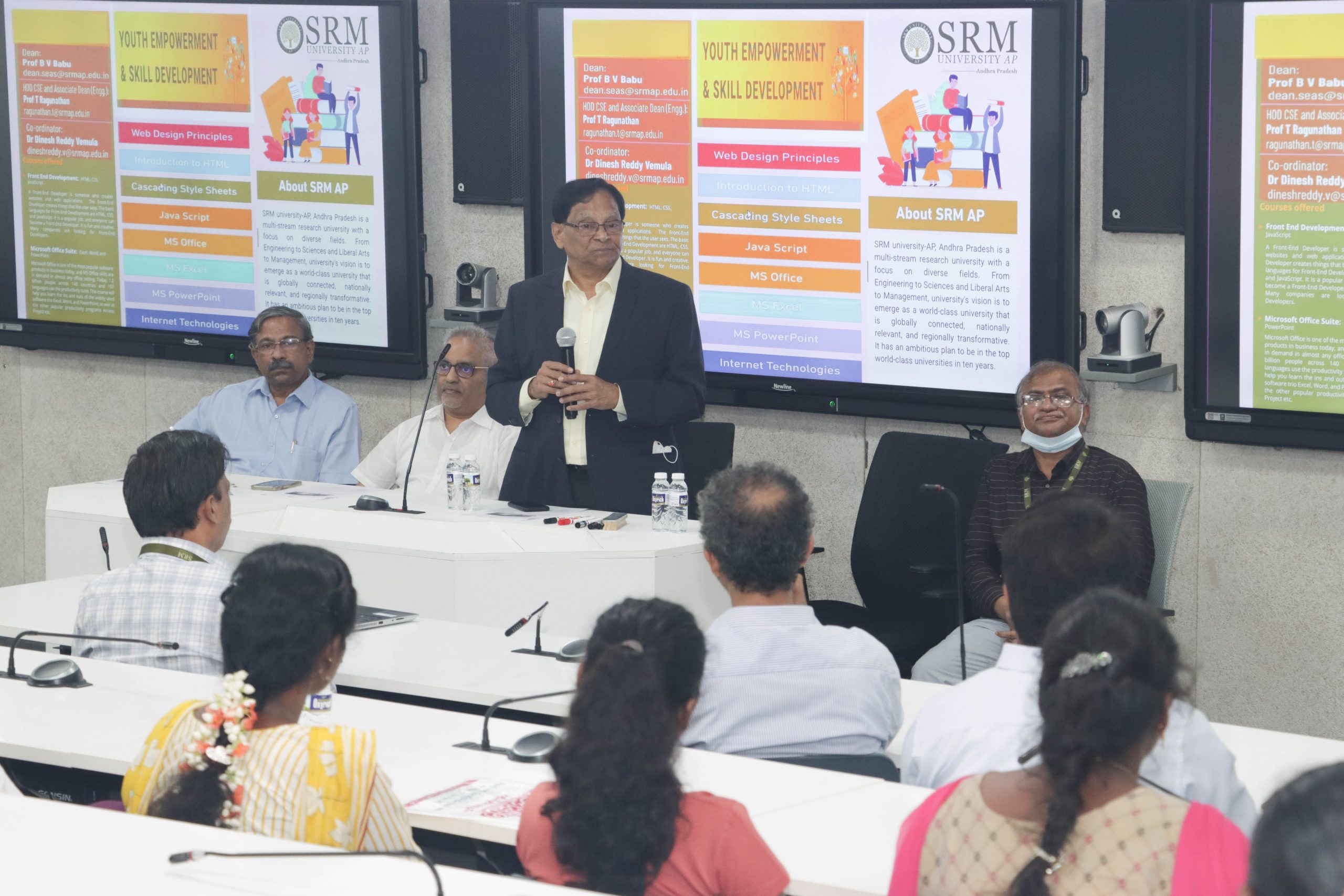
The Department of Computer Science and Engineering at SRM University-AP commenced a one-month-long programme on “Youth Empowerment and Skill Development” with its inaugural ceremony on August 29, 2022. The programme, organised under the ISR activities of the university, is an exclusive initiative for young people living in the vicinal rural communities to enhance and develop their technical and computing skills that will augment their possibilities for a better livelihood.
At the inaugural function, Prof T Ragunathan, Associate Dean- SEAS & the Head of the Department welcomed the gathering. He expressed the university’s objective in conducting the programme and how it would create far-reaching implications in the personal and professional development of the rural youth. Honourable Vice-Chancellor Prof VS Rao delivered the inaugural address and appreciated such dedicated and active initiatives aiming at the holistic welfare of society. “Equitable development of the society should be the vision of the modern education, enabling the young generation of this country to grow into the greatest wealth of our nation”, he remarked.
Prof BV Babu, Dean-SEAS presided over and emphasised the necessity of facilitating and preparing the youth to face the challenges of a technology-driven world. Digital literacy and computer awareness have become the inevitability of present times, causing a marked shift in the operations of the secondary and tertiary sectors. Registrar Dr R Premkumar also addressed the gathering. An empowered youth with digital and computer expertise will keep the country’s future safe in their hands. The Programme coordinator Dr V Dinesh Reddy, Assistant Professor- Department of Computer Science and Engineering proposed the vote of thanks.
The programme received an overwhelming response from around fifteen neighbouring villages. As part of the workshop, courses will be offered on web designing and internet technologies such as Front-End Development and Microsoft Office Suite.. Students will be introduced to basic web designing principles, MS office, Javascript, HTML, etc. Classes will be held from August 29, 2022, to September 28, 2022, from 5.30 pm to 7.00 pm at the university premises.
- SRM varsity to form DST-SATHI cluster August 30, 2022
The-Hindu – August 30
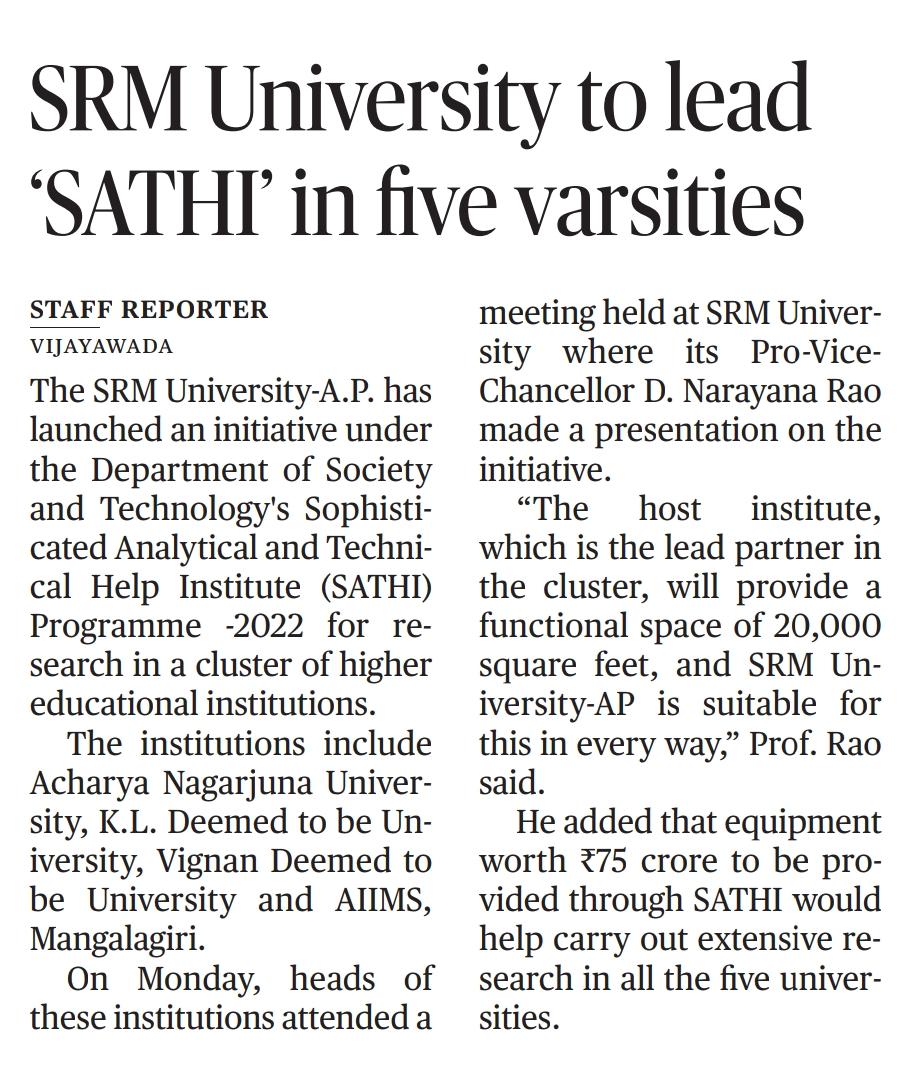
The-New-Indian-Express – August 30
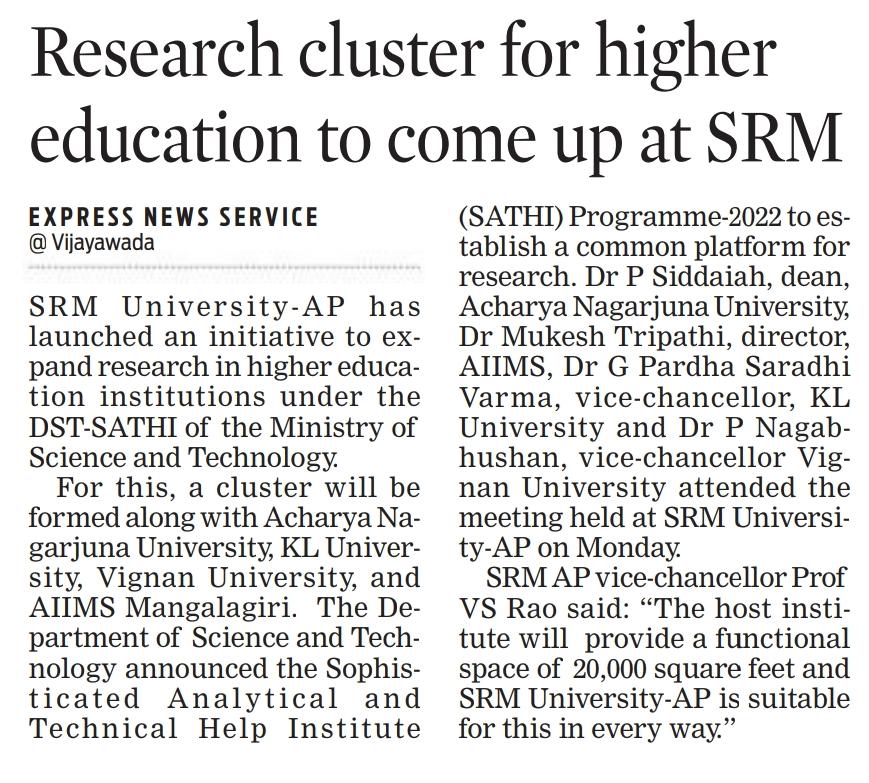
The-Hans-India – August 30
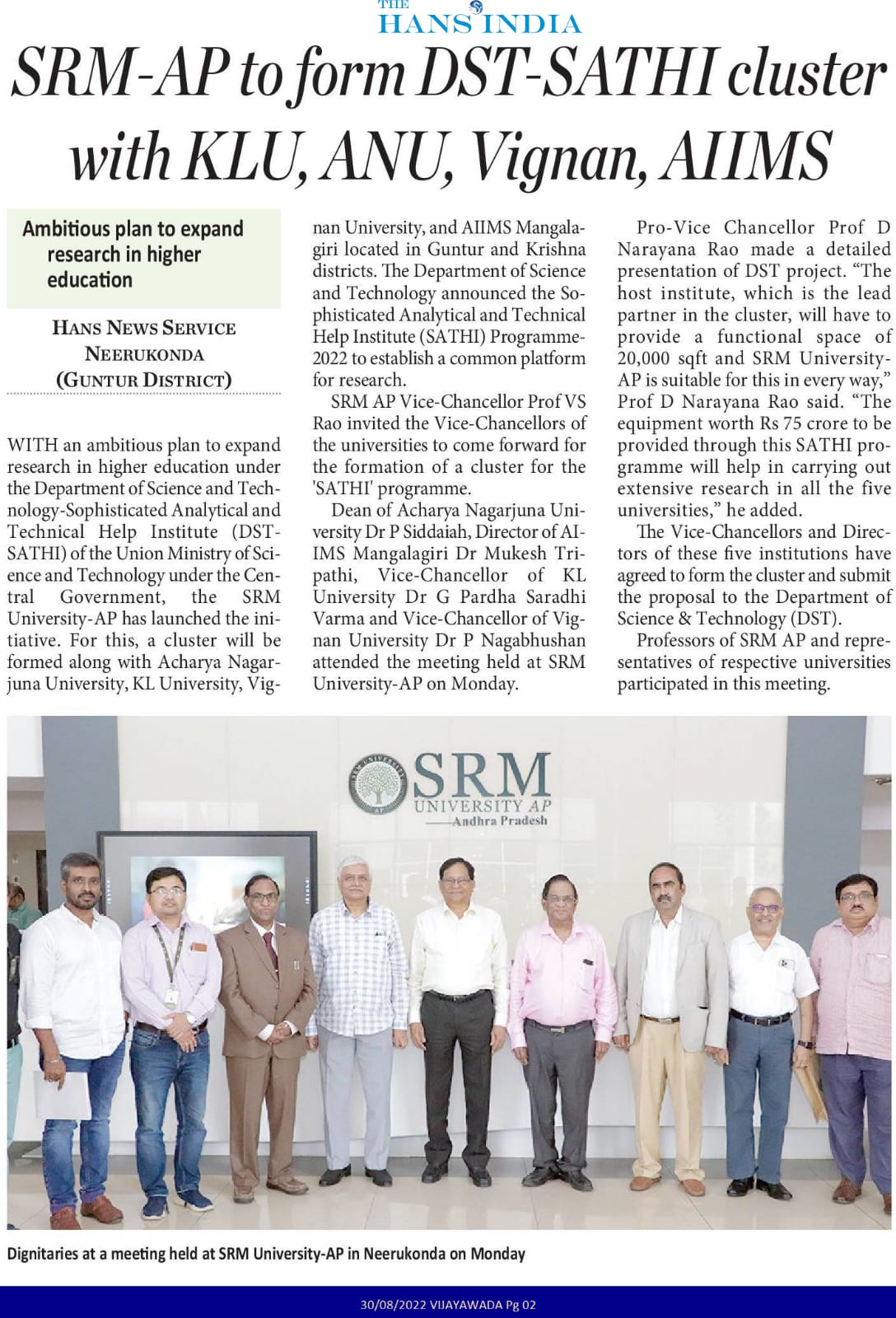
The-Pioneer – August 30
Continue reading →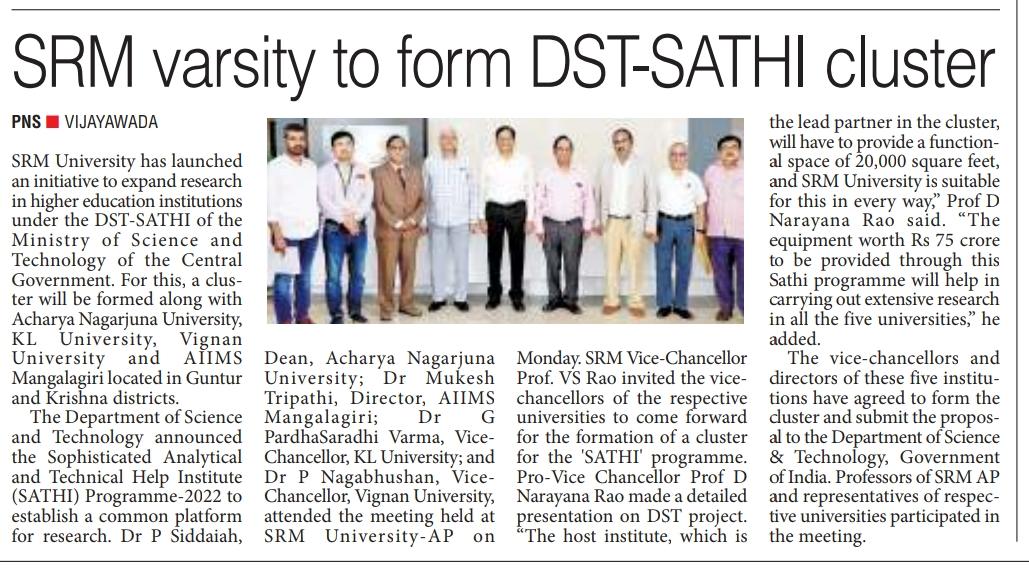
- DST-SATHI cluster with KLU, ANU, Vignan University and AIIMS August 30, 2022
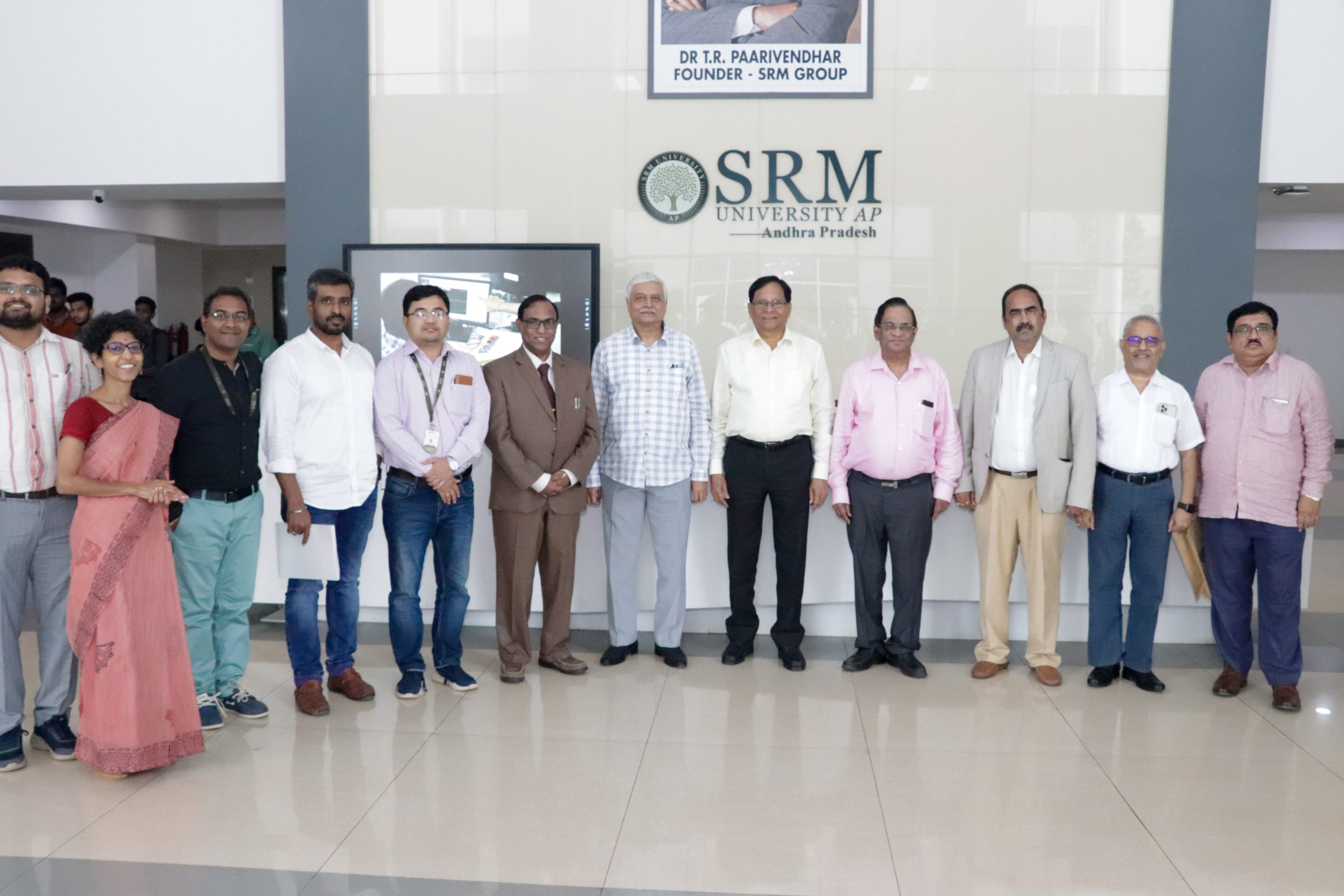 SRM University-AP formed a cluster with Acharya Nagarjuna University, KL University, Vignan University, and AIIMS Mangalagiri for the DST-SATHI initiative of the Ministry of Science and Technology. Sophisticated Analytical & Technical Help Institute (SATHI) aims to provide professionally managed services with efficiency, accessibility and transparency of the highest order under one roof to service the demands of industry, start-ups and academia. Dr P Siddaiah – Dean, Acharya Nagarjuna University; Dr Mukesh Tripathi, Director-AIIMS Mangalagiri; Dr G Pardha Saradhi Varma – Vice Chancellor, KL University; and Dr P Nagabhushan – Vice Chancellor, Vignan University; attended the meeting held at SRM University-AP campus on Monday.
SRM University-AP formed a cluster with Acharya Nagarjuna University, KL University, Vignan University, and AIIMS Mangalagiri for the DST-SATHI initiative of the Ministry of Science and Technology. Sophisticated Analytical & Technical Help Institute (SATHI) aims to provide professionally managed services with efficiency, accessibility and transparency of the highest order under one roof to service the demands of industry, start-ups and academia. Dr P Siddaiah – Dean, Acharya Nagarjuna University; Dr Mukesh Tripathi, Director-AIIMS Mangalagiri; Dr G Pardha Saradhi Varma – Vice Chancellor, KL University; and Dr P Nagabhushan – Vice Chancellor, Vignan University; attended the meeting held at SRM University-AP campus on Monday.SRM AP Vice-Chancellor Prof V S Rao invited the Vice-Chancellors of the respective universities to come forward for the formation of a cluster for the ‘SATHI’ programme. Pro-Vice Chancellor Prof D Narayana Rao did an elaborate presentation on DST projects. “The host institute, which is the lead partner in the cluster, will have to provide a functional space of 20,000 square yards, and SRM University-AP is suitable for this in every way”, Prof D Narayana Rao said. “The equipment worth Rs 75 crore to be provided through the SATHI programme will help in carrying out extensive research in all the five universities,” he added. The Vice-Chancellors and Directors of these 5 institutions have agreed to form the cluster and submit the proposal to the Department of Science & Technology (DST), Government of India. Professors of SRM AP and representatives of respective universities also attended the meeting.
Continue reading → - SRM University- AP inked MoU with Rennes Business School August 29, 2022
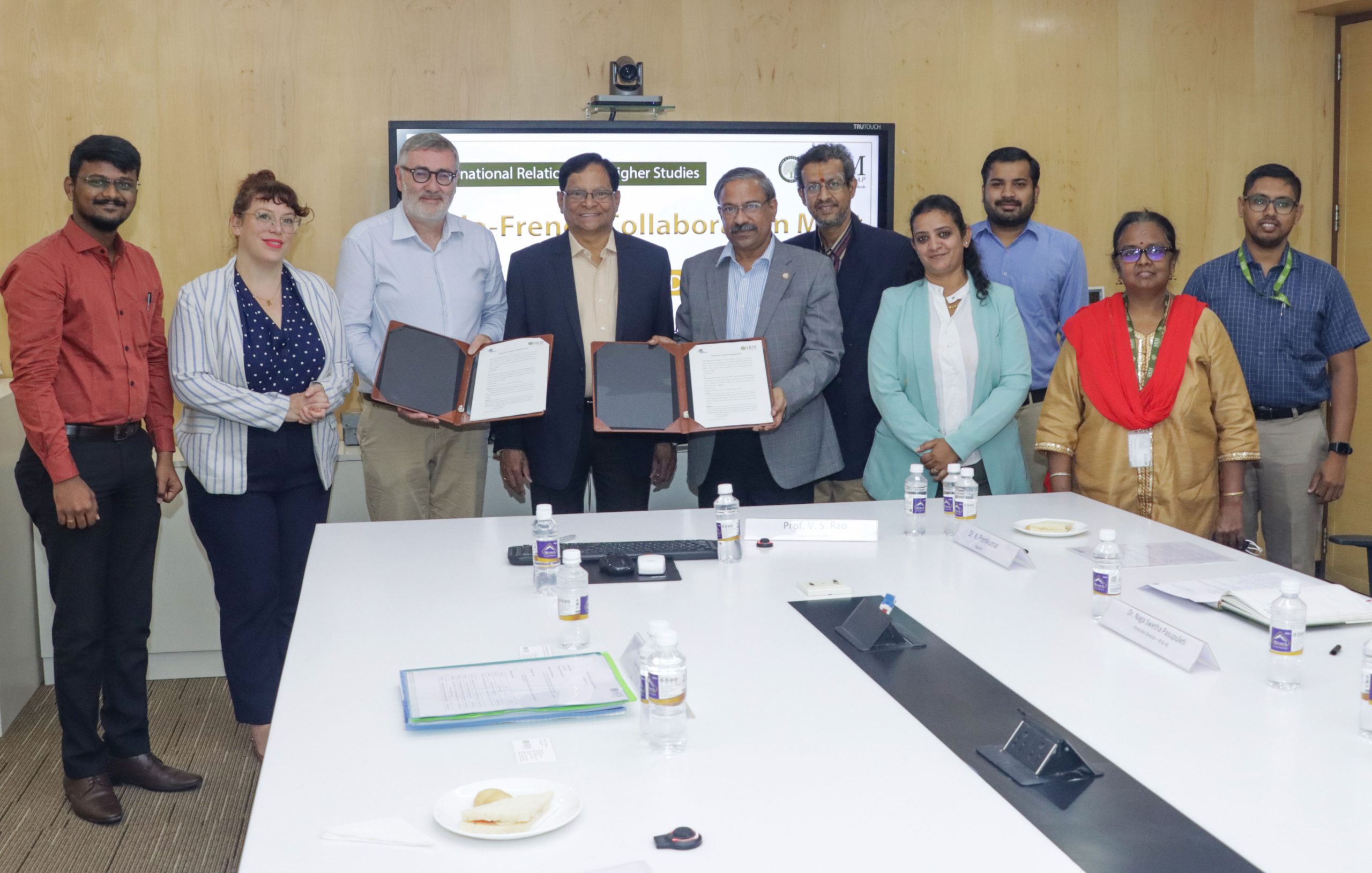 Indo-French diplomatic relations have always tailored development across all major disciplines. SRM University- AP has inked an MoU with the Rennes School of Business on August 23, 2022. The two institutions agreed to promote mutually beneficial activities in education, research, and other academic areas. The alliance in specific targets the internationalisation of higher education.
Indo-French diplomatic relations have always tailored development across all major disciplines. SRM University- AP has inked an MoU with the Rennes School of Business on August 23, 2022. The two institutions agreed to promote mutually beneficial activities in education, research, and other academic areas. The alliance in specific targets the internationalisation of higher education.SRM University- AP aspire to strengthen the ties with Rennes School of Business following the mutual interests in delivering programmes of academic excellence and cultural diversity. Honourable Vice-Chancellor Prof V S Rao commented that the collaboration would open the gates of higher studies and research work for SRM University- AP and Rennes Business School. Both institutions are determined to work together with the spirit of prolific international relations and academic cooperation.
Dr Thomas Froehlicher, Dean, Rennes School of Business, and Ms Maud LE BARS, South Asia Area Manager, Rennes School of Business, were the delegates who visited the campus to sign the MoU. “India and France share common historical events and many cultures. This collaboration will benefit both the nations and the students”, said Dr Thomas as he briefed his thoughts on the alliance.
The coordination between the institutes may include but is not limited to progression programmes and semester abroad programmes. The agreement looks forward to organising executive programmes for the professional community, joint research projects, joint conferences and publications, exchange of faculty members, collaborative virtual student projects, short study abroad seminars, executive education, and admission to degree-seeking students on a fee-paying basis.
Dr Bharadwaj, Dean SEAMS, Dr CA Mahalakshmi Mudliar, Associate Professor of SEAMS, and Dr Naga Swetha Pasupuleti, Associate Director of International Relations, had a vigorous discussion with the Rennes business school representatives regarding the areas of collaboration. Dr R Premkumar, Registrar and Dr Thomas Froehlicher, Dean of Rennes Business School, signed the MOU and exchanged the documents.
Continue reading → - Towards the construction of a skilled youth August 26, 2022
“We cannot always build the future for our youth, but we can build our youth for the future”
– Franklin D Roosevelt
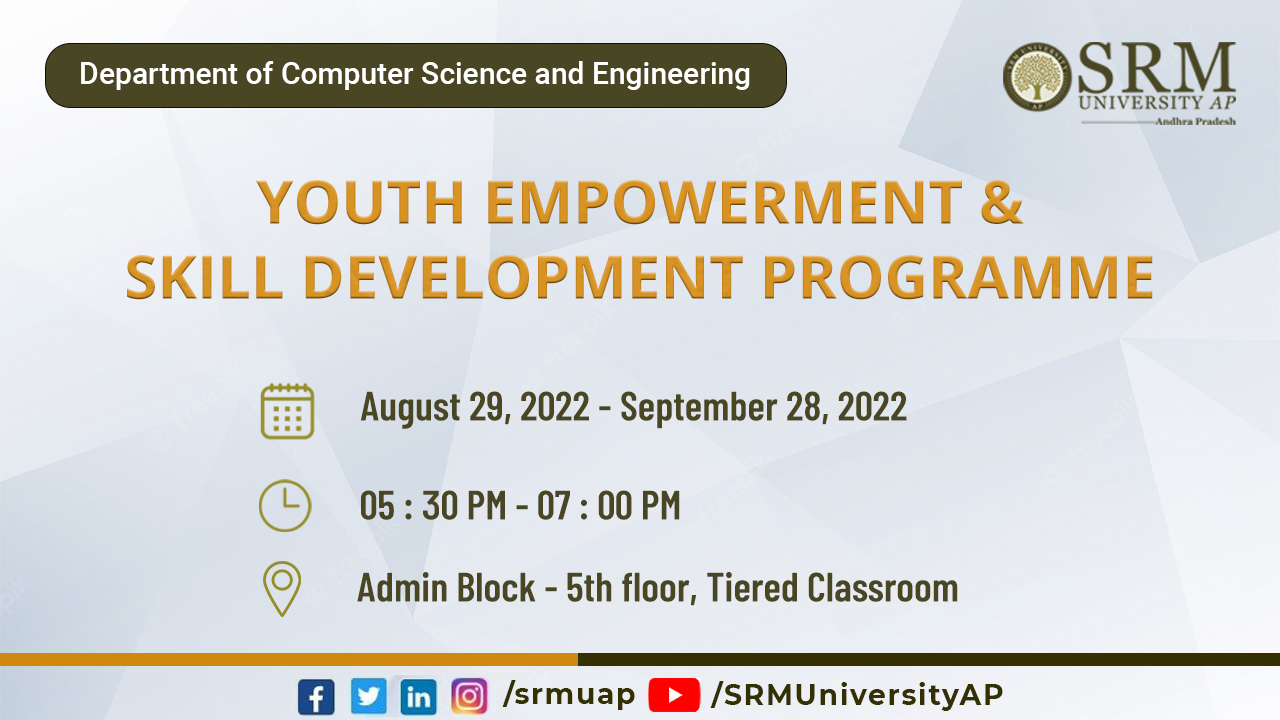
India is one of the countries in the world currently experiencing an explosion in the youth population. And undoubtedly, skilled youth is the supreme asset of any land. However, the dismaying fact is that the surpassing potential of our youth is yet to be explored to its fullest. Higher institutes of learning and universities play a pivotal role in equipping their students to face the ever-evolving world fraught with unseen challenges. Reckoning with this alarming fact, the Department of Computer Science and Engineering at SRM University-AP is organising a one-month-long programme on “Youth Empowerment and Skill Development” under the ISR activities of the university from Aug 29, 2022, to Sept 28, 2022.
The programme is exclusively organised for young people living in rural communities near SRM University-AP with an aim to develop the knowledge and experiences that will help them live happier, more fulfilling lives and improve their ability to make better decisions about their future. Courses are offered across various domains such as internet technologies, web development, MS office, and the like that have become essential tools in a technology-driven world.
The inaugural session is scheduled on August 29, 2022, at 05.15 pm. The event will be graced by the honourable Vice-Chancellor Prof VS Rao, Dean – SEAS Prof BV Babu, Associate Dean – SEAS & the Head of the Department of CSE – Prof T Ragunathan, and other university dignitaries. Classes will be conducted between 5.30 pm and 7.00 pm during the month.
Join us and empower yourself for a better tomorrow.
Continue reading → - Prof G S Vinod Kumar to be the Chief Faculty Mentor of Patent Maker August 26, 2022
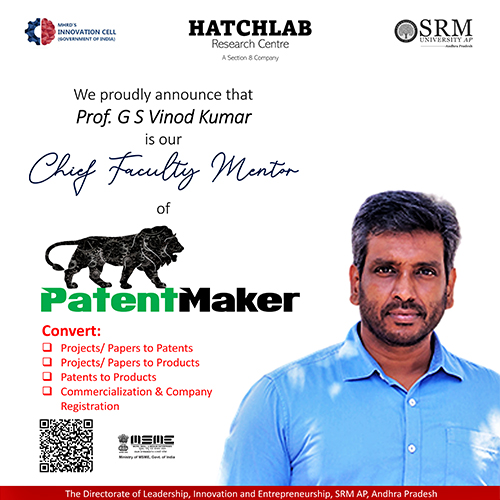 The Hatchlab Research Centre has been nurturing innovative ideas and inspirational ambitions for paving the way to an extraordinary tomorrow. Patent Maker was the beginning of a new chapter in these explorations, armed with the potential to work out the unworkable. The Directorate of Entrepreneurship and Innovations and is glad to announce that Prof G S Vinod Kumar, Department of Mechanical Engineering, has been appointed as the Chief Faculty Mentor of Patent Maker.
The Hatchlab Research Centre has been nurturing innovative ideas and inspirational ambitions for paving the way to an extraordinary tomorrow. Patent Maker was the beginning of a new chapter in these explorations, armed with the potential to work out the unworkable. The Directorate of Entrepreneurship and Innovations and is glad to announce that Prof G S Vinod Kumar, Department of Mechanical Engineering, has been appointed as the Chief Faculty Mentor of Patent Maker.Prof G S Vinod Kumar, an expert, mentor, and multidimensional professional, has been there from the very inception of this initiative. Patent Maker is a common platform which will not only facilitate the conversion of ideas, products, concepts, and research papers to patents but will also help them commercialise with the help and support of the industry. It encourages every aspirant who wants to contribute to the nation and bridges the gap between industry and academia.
Hatchlab Research Centre believes in the power of connection and creates opportunities for students to converse their field of interest with experts around the map. The team actively engages in the university’s innovation, research, and entrepreneurship activities. The focus also relies on concreting a start-up ecosystem with the help of corporates, enablers, world-class mentors, top-class institutions, foundations, incubators, and the government. Patent Maker is one of the biggest initiatives of the Hatchlab Research Centre. It aspires to be a support system for projects and patents that deserve a high commercial application.
Continue reading →

